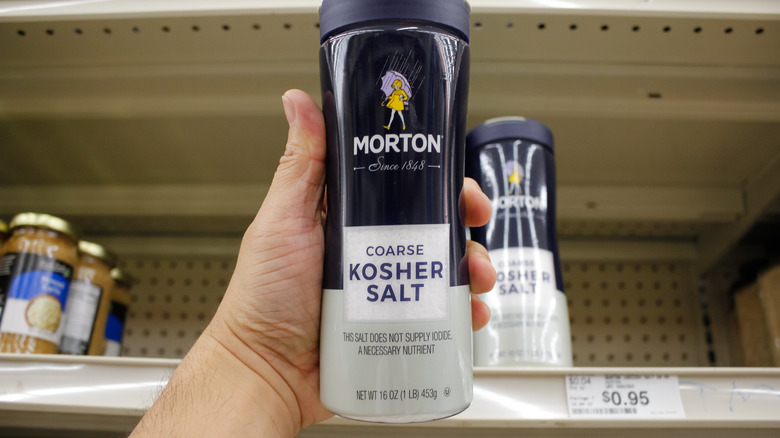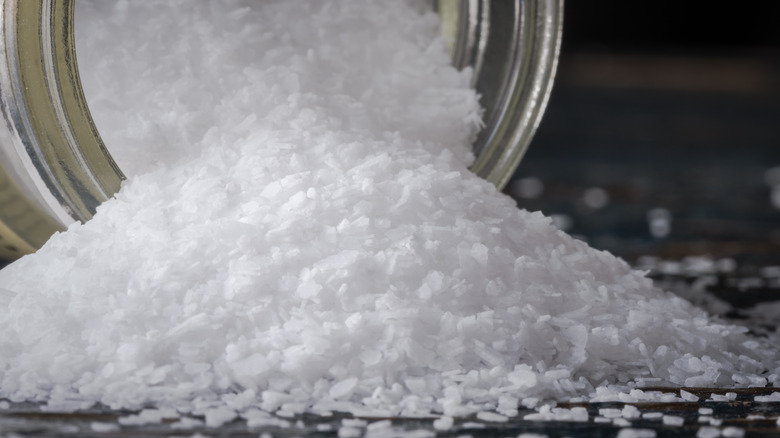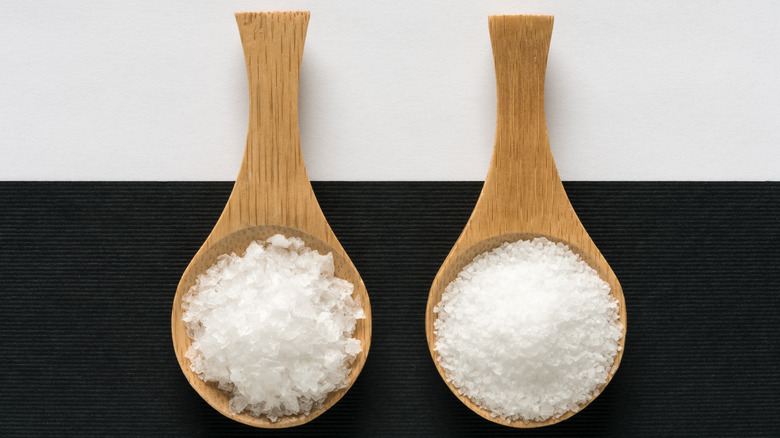What Is Kosher Salt Really?
Salt has gotten a bit of a bad rap lately. While it's true that too much sodium can have negative health effects — from high blood pressure to stroke — salt is a necessary nutrient for our bodies to function properly (via the American Heart Association). According to Live Science, the minimum amount of sodium we need per day is about 1,500 milligrams, which is the equivalent of about three-quarters of a teaspoon of salt. It helps keep your cells hydrated and your nerves and muscles running as they should.
But not all salt is created equal. Take a walk down the spice aisle at the grocery store and you'll see just how many different types of salt exist, like table salt, sea salt, and pink Himalayan salt. (And that's not even including all of the different brands, from Redmond's to Morton's.) One of the most popular types you'll find is kosher salt. Here's what makes kosher salt different than the others.
What is kosher salt?
You might not be able to judge a book by its cover, but you can definitely judge a jar of salt by its appearance. The identifying feature of kosher salt is its coarse grain. It has much larger flakes than other types of salt, making it easy to pinch between your fingers, Healthline explains. While kosher salt can be used for anything, The Kitchn points out that it's most commonly used for brining meats, seasoning dishes, and making pasta water, thanks to its oversized texture. Tasting Table dubs it the most versatile of all the salts.
As for where the name "kosher salt" comes from? According to The Salt Box, it has Jewish origins. To kosher meat — which is required in the Jewish faith — one must drain all the blood from the animal during the slaughtering process. One of the best ways to do that is by using kosher salt to draw out the blood and thus, the name was born.
What does it taste like?
Salt is salt is salt ... right? After all, if you were asked to described the flavor of salt, you'd probably say it's, well, salty. But it turns out there are slight differences in the flavor profiles of each type of salt. The main thing that sets kosher salt apart in taste is that it lacks iodine, which is found in the standard bottle of table salt (via A Couple Cooks). Iodine, while it helps prevent goiter (a condition caused by an iodine deficiency in the body, reports HuffPost), also lends a bitterness to the salt. Hence, kosher salt is milder and has less of a bite than its table salt counterparts.
"Iodine doesn't taste great, and nobody wants bad-tasting things mixed into their salt," a writer at Bon Appétit says, describing the non-iodized kosher salt as the "MVP of our breakfast, lunch, and dinner seasoning game."
Is there a difference between kosher salt and sea salt?
Both sea salt and kosher salt are characterized by their flaky, oversized grains. But don't assume that just because the two types look alike they are alike — turns out there are a few things that set kosher salt apart from sea salt. For starters, they come from different places. As the name suggests, sea salt is made by dehydrating ocean water and turning it into crystals, The Kitchn explains. Kosher salt, on the other hand, is mined from underground caves (as is table salt, FYI). Sea salt tends to be more inconsistent in size and more expensive than kosher salt as well (via Spoon University).
At their core, kosher salt and sea salt are both sodium chloride. But All Recipes points out that they can (and should) be used in different ways. Because it costs more and can be difficult to measure accurately, sea salt works well as a finishing touch on dishes. Kosher salt is much more versatile, and, because of its large grain size, works well for anything that you're seasoning by hand.



